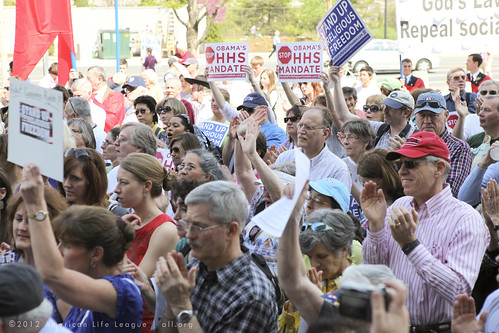
Participants at a Stand Up for Religious Freedom Rally on March 23, 2013 protest President Obama's HHS Mandate. Credit: Creative Commons/American Life League.
In 1907 Mark Twain published a scathing attack on Christian Science, which held that all illness lay in the mind. In his trademark satirical style, Twain congratulated the religion for providing “life-long immunity from imagination-manufactured disease.”
The other kinds of disease were real, Twain insisted, and their victims required medicine – not prayer – to get better. But Twain also condemned the growing movement to prosecute faith healers and parents for withholding medical care from children who died.
A century later, we know much more about what makes people sick and well. As Twain understood, though, we still need to balance the protection of children with the religious liberty of their parents. And that’s why we should retain narrowly crafted laws exempting parents from child-abuse charges if they resist medical care for religious reasons.
Such laws are under fire again in the wake of the recent death of Brandon Schaible, an 8-month-old boy in suburban Philadelphia who succumbed to pneumonia after his parents did not take him to a doctor. The parents had already been convicted of involuntary manslaughter in the death of another son, who also died of pneumonia in 2009. They had been sentenced to ten years’ probation and ordered to seek medical care if their other children got sick.
But here’s the kicker: Pennsylvania already has a medical exemption law, as do 43 other states. Most of these measures exempt parents from prosecution only if a child isn’t seriously harmed. And even when the laws protect parents from criminal charges, they often allow courts to require medical care or to remove kids from parental custody.
That’s what happened to the Schaibles, whose seven other children were placed in foster care after Brandon died. The parents are being held without bail pending a hearing next week.
So why have exemption laws at all? Because they honor religious freedom, even for people whose ideas seem odd or abhorrent to many of us. That’s one of the greatest achievements of American history, and it’s much more recent than we often realize.
Consider the Jehovah’s Witnesses, whose children were taunted, beaten, and expelled for refusing to salute the flag in public schools. The Supreme Court upheld laws requiring the salute in 1940 but reversed itself three years later, providing a ringing affirmation of religious liberty.
“If there is any fixed star in our constitutional constellation,” the Court declared, “it is that no official, high or petty, can prescribe what shall be orthodox in politics, nationalism, religion, or other matters of opinion or force citizens to confess by word or act their faith therein.”
So if you can’t force kids to say a prayer, can you require them to receive blood transfusions? The Jehovah’s Witnesses don’t believe in those, either. Yet in 1962, a New Jersey court upheld the conviction of a Witness couple who had stopped doctors from giving their deceased son a transfusion that would have saved his life.
The couple cited a state law that parents could not be prevented from treating their children’s illnesses “in accordance with [their] religious tenets.” The court acknowledged the parents’ “personal freedoms” to practice their faith, but concluded that “protection of a child’s welfare” trumped them in this case.
And that’s exactly why we should keep religious exemption laws, which force us to keep both of these goals in mind. I wouldn’t want to live in a country where religious believers could harm their kids with impunity. But I also wouldn’t want to require every parent to provide the same kind of care, no matter what they believed.
That brings us back to Mark Twain, who understood how easy – and dangerous – it was for the government to run roughshod over faith. After the first edition of his book on Christian Science came out, he received several letters arguing for legal restrictions on its practitioners. “It is a burning shame that the law should allow them to trust their helpless little children in their deadly hands,” the correspondents said.
To Twain, though, that was like saying that every father wants “the very best” treatment for his child, “but it is a burning shame that the law does not require him to come to me to ask what kind of healer I will allow him to call.”
And the law, Twain reminded us, “is merely a multiplied ‘me.'” Even as we take steps to protect children of different faiths, we should also be wary of imposing a single single standard of medicine on their parents. Religious freedom isn’t absolute, and never should be. But it’s still the best idea America has come up with so far.
Jonathan Zimmerman teaches history at New York University and lives in suburban Philadelphia. He is the author of Small Wonder: The Little Red Schoolhouse in History and Memory (Yale University Press).
Thank you for this important article to help us understand some critical issues about care for our children, religious affairs & public health.
Unfortunately, the human laws that govern these considerations remain very complicated.
agree with Mark Twain and author’s viewpoint. Because we don’t have the government requiring to believe as it demands, and that while children are not ‘property’ of parents, its important to curtail government interference of parenting. which is now far too common. And also can lead to gradual encroachment of government on religious freedom.
A child’s life is much more important than whatever crazy things his parents believe. Comparing forcing a child to “say a prayer” or “salute a flag” to giving a child a blood transfusion that could save his life against his parents will is just silly. These parents should go to jail.